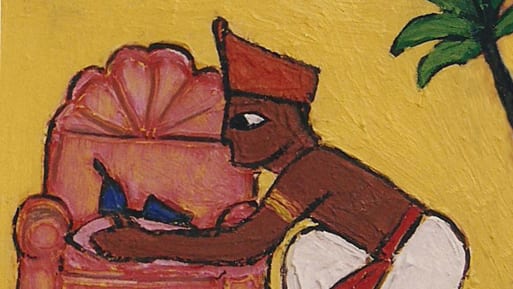Rama’s Sandals and the Spirit of Dialogue
Bringing the spiritual dimension into conflict mediation
By Aaron Wolf The Ramayana describes Rama’s exile at his stepmother’s behest, so that her son Bharata would become king instead. Bharata, distraught, goes to Rama’s forest retreat and begs Rama to return and rule, but Rama refuses to disobey the decree. Bharata then takes Rama’s sandals saying, “I will put these on the throne, and every day I shall place the fruits of my work at the feet of my Lord.” Embracing Rama, he takes the sandals and returns to Aydohya.
The Ramayana describes Rama’s exile at his stepmother’s behest, so that her son Bharata would become king instead. Bharata, distraught, goes to Rama’s forest retreat and begs Rama to return and rule, but Rama refuses to disobey the decree. Bharata then takes Rama’s sandals saying, “I will put these on the throne, and every day I shall place the fruits of my work at the feet of my Lord.” Embracing Rama, he takes the sandals and returns to Aydohya.
In modern day India, Hindu deities are actually the legal owners of temples dedicated to them. As such, they become official stakeholders in issues relating to the temple or surrounding lands or water. Often, in stakeholder meetings, their presence is represented by a pair of sandals on a chair, in allusion to Bharata’s example. Participants report that the sense of having a deity in the room has a definite impact on the tenor of discussion.
I’m a mediator who works with communities or countries that are working collaboratively to manage rivers that cross their borders. Within a country, that generally means ranchers, environmentalists, urban users, and hydropower generators are sitting around the table. If it’s an international issue, it might be Arabs and Israelis, Indians and Pakistanis, or Azeris and Armenians. While the water brings them into the room, and gives them a common language for dialogue, the issues are often contentious, couched as they are in very divergent needs and worldviews.
In the West, we are generally trained to base our approach on rationality; tools typically focus on what is measurable and quantifiable. We “separate the people from the problem” and “insist on objective criteria.” If only we could see the tangible benefits of cooperating, we are taught, we simply would.
Those who have been involved with conflict in any depth, as well as an increasing number of mediators and facilitators, speak more in terms of “shaping the energy in the room,” and, instead of trying to quantify or model benefits, focus instead on transformational moments: those brief flashes of transcendence when, suddenly, everyone involved just “gets” it, and can move forward with new shared understanding.
To understand the process of transformation and the settings most likely to induce these shifts, then, we can look past the field of modern rational conflict resolution. We turn instead to the world of spirit and transcendence. Every spiritual tradition in the world, after all, is devoted to precisely this process of transformation: to guide people in moving from a focus on their own immediate wants and desires, to addressing more their obligations to society, humanity and to the divine.
In my workshops, I share constructs and tools for applying these insights and empathic connections to the process of conflict transformation, from the interpersonal to the international. I share facilitation and mediation approaches drawn from the world’s faith traditions, and how introducing the spiritual dimension can promote healing in difficult conversations.
Aaron Wolf is a water resources scientist and professor in the College of Earth, Ocean, and Atmospheric Sciences at Oregon State University. He will be co-leading “The Chemistry of Connection in our Individual, Collective, and Natural Worlds,” at the Garrison Institute on May 27 – 30.